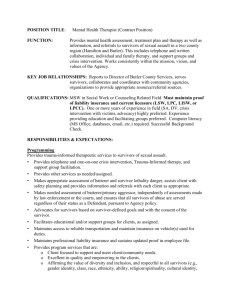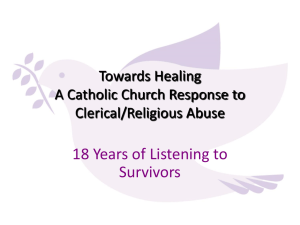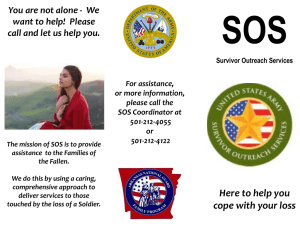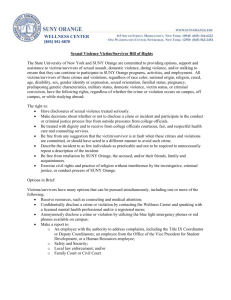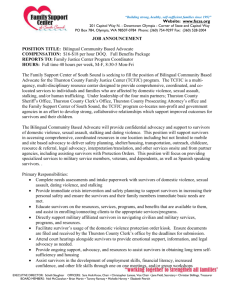BREAKING THE SILENCE The role of the church in addressing sexual
advertisement
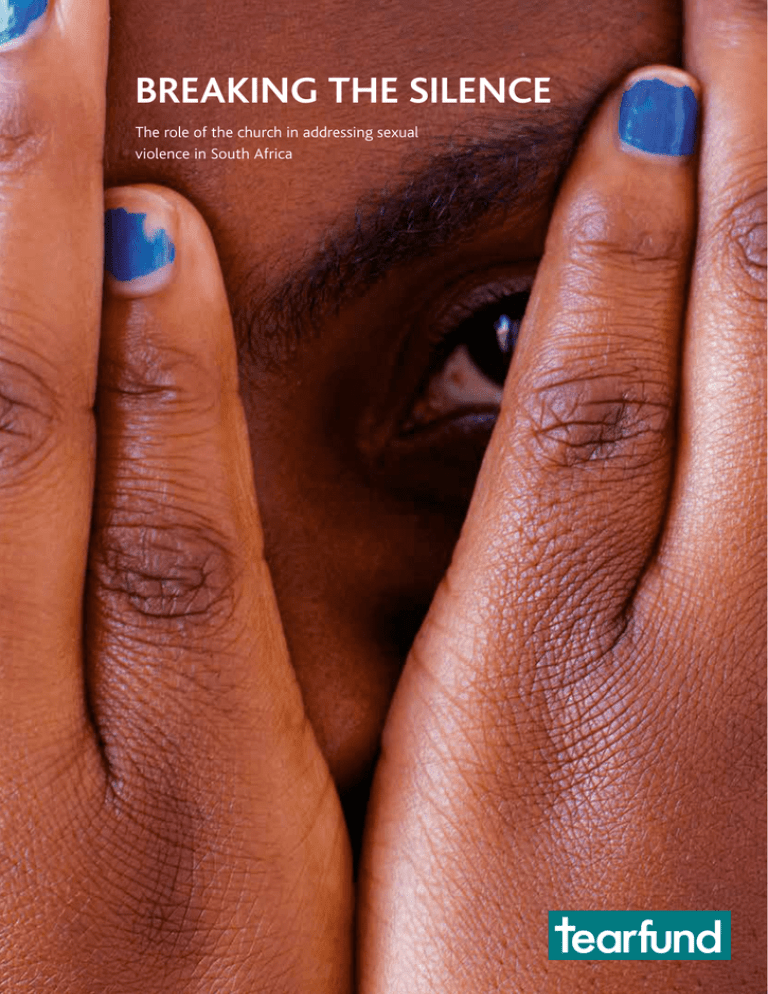
BREAKING THE SILENCE The role of the church in addressing sexual violence in South Africa This report is a compiled from two pieces of research commissioned by Tearfund’s HIV & Sexual Violence Unit. The full reports and researchers are: –Sexual violence in South Africa and the role of the church by Elisabet le Roux at the Unit for Religion and Development Research at Stellenbosch University –Breaking the Silence (full report) by Robyn Curran, Bongi Zengele and Solange Mukamana. Tearfund is a Christian relief and development agency building a global network of local churches to help eradicate poverty. It has more than ten years’ experience of working through church-based partners in the response to sexual violence. Tearfund is also a founding member of We Will Speak Out (www.wewillspeakout.org) – an international Christian coalition working together to end sexual violence. Tearfund South Africa is an affiliated organisation of Tearfund, based in Durban. It seeks to be an enabling organisation, coming alongside the most vulnerable people, building collaborations across boundaries so that the church and community work together to bring justice, peace and hope across the land. Tearfund contact: Veena O’Sullivan Email: veena.osullivan@tearfund.org Website: http://tilz.tearfund.org/sexualviolence Written by: Jo Johnston Editor: Seren Boyd Design: Bluemango Creative © Tearfund November 2013 All names have been changed to protect identity. Throughout the report, the term ‘survivor’ is used to refer to those who have experienced sexual violence and lived. SV is considered to be any form of sexual violence and molestation through force, coercion or deception. While SV is sometimes aimed at men, it is predominantly experienced by women and children, with men as the perpetrators. Although rape by strangers does occur, survivors often know their attacker – husbands, boyfriends, relatives, neighbours or, in the case of sex workers, clients. Many cases of SV are perpetrated by people in positions of authority. The full copies of original research reports are available for download at http://tilz.tearfund.org/sexualviolence Front cover photo: © Christina Shange/Tearfund SA Cover photo: Thandi, a survivor of sexual violence, committed to breaking the silence, speaking out and building a peer movement in South Africa. F O R E WO R D3 Foreword Breaking the silence speaks to the core of who we are as a nation: a church seeking to reflect Jesus and communities who have desires and dreams for a different future. We have failed terribly as a community and as a nation in protecting our most vulnerable women and girls who have suffered violence, not once but many times over. Our collective silence has made the pain even more unbearable, encouraging survivors to bury their pain and brokenness in silence. South Africa, our beautiful and incredible nation, has triumphed over much, but has also failed much as our vulnerable women and girls have gone through abuse and rape. The numbers are staggering The avenues for seeking justice and healing are inadequate. The silent pain is deafening. collectively, to sift through the blind spots we have allowed to manifest themselves. It will take resilience and deep determination to persevere in our search for safety and in ensuring the nation’s laws provide a framework for justice and protection so it may be embedded in our everyday life. The church and local faith communities are part of the woven tapestry of this nation which has a rich history of standing up against injustices. Surely, we can revive that collective spirit once again; we can join our hearts, our minds and our hands to end another tragedy. Our faith teaches and gives us the foundation to build a violence-free South Africa where men, women, boys and girls work together to bring peace for all. We speak out with one voice putting aside our differences and division It will take courage but we have done mighty things before and we can do it again. It will take deep reflection, both personally and My personal dream is that together we can draw a line and move forward to a different future. Let South Africa be known as the nation where our most vulnerable are now empowered and protected by the law. Most Revd Thabo Makgoba Anglican Archbishop of Cape Town and Metropolitan of the Anglican Church of Southern Africa Breaking the silence demonstrates the urgent need for the local and national church in South Africa to unite, work with key stakeholders and take action to end sexual violence (SV). It highlights three key points: 1 2 Sexual violence is widespread across South Africa and has a deeply traumatising and damaging effect on survivors. 3 The church is central to community life and has untapped potential to prevent and respond to sexual violence. It can provide care and support, stand alongside survivors seeking justice, and identify and challenge harmful attitudes and beliefs within society that perpetuate sexual violence. The church has often failed survivors of sexual violence. Many churches deepen the impact of sexual violence through their silence, stigma and discrimination. Some churches have not done enough to care for the marginalised or to speak out on their behalf. 4 BRO KEN INSIDE Survivors of sexual violence often feel isolated and are offered little care and support due to stigma and discrimination. Photo: Christina Shange/Tearfund SA Broken inside South Africa is often called the cradle of humankind, a rainbow nation known for its culturally rich and diverse population. Rooted in the heart of both urban and rural communities, the church is a key and important civil society organisation. It has the power to transform social norms and influence culture for good. Between 60 and 80 per cent1 of South Africa’s population profess to be Christians. But South Africa has been ignoring a shocking and uncomfortable truth – that it has one of the highest rates of sexual violence (SV) in the world. Communities and churches are often silent on the issue, implying apathy and acceptance of SV. This often prevents survivors from feeling able to disclose and seek support and justice. It’s time to break the silence. Breaking the silence is a report by the Christian relief and development agency, Tearfund South Africa. It provides valuable insights into the experiences and priorities of survivors, linking these to the potential role the church has to play. It prioritises listening to survivors’ stories, documents survivor perspectives on why SV is entrenched in communities, and challenges a silent church to take action to end SV. The Unit for Religion and Development Research at Stellenbosch University was commissioned to undertake research on SV and on the potential role of the church in tackling SV in townships and poor rural communities in Bredasdorp and Du Noon in the Western Cape and in and around Pietermaritzburg and Durban in KwaZulu-Natal. choose to die silently. You’re too scared to talk “ Iabout it and you don’t know who to tell. ” SV survivor, Durban 1 60%: Gallup International Association. Global index of Religion and Atheism (2011) 80%: Statistics South Africa (Census 2001) B R O KE N IN SI DE Speaking to female survivors of SV2 and young people, as well as to church and community members and leaders, the researchers expose how violence towards women and girls is widespread within society and that young girls in particular are at high risk. 5 It also documents the heartbreaking truth of what happens to survivors in the aftermath of attack – the absence of the church, the failure of the justice system, the ruthless opinions which lead to further stigma and rejection. been raped more than 20 times. It has numbed “ I’ve me. I don’t have feelings. I can’t trust anyone. It has broken me inside.” Nelisiwe, Durban Nelisiwe is one of thousands of women who have been repeatedly abused in South Africa. parenting, cramped social housing, lack of employment, alcohol and substance abuse. The research underlines the fact that many women are likely to face repeated rape, due to entrenched cycles of familial abuse. The abuse is continued down the generations, by parents who were themselves abused, by mothers turning a blind eye because they are dependent on the perpetrator, the breadwinner. Many organisations are working to address the issue, including a committed government who has given a strong commitment and adopted a national framework to end gender-based violence. Yet, strong coalitions across faith communities are lacking – and so too is meaningful action on their part. Another survivor shares, “I was five years old when my mother met him and he started to sexually molest me. Even the gardener did it. You feel like you have a label, because all men try it. It felt to me like it was written on my head.” Within the harshest and poorest of communities, conditions serve only to make women and girls more vulnerable to SV: non-existent or neglectful Tearfund’s vision is to see churches working together to restore relationships between men and women, speaking out with honesty and integrity about gender justice and harmful cultures and beliefs. This is possible if a fragmented church unites and realises its powerful potential to speak out to end SV. To break the cycle of violence, we must start by breaking the silence. South Africa •During 2011–2012, more than 64,000 rapes were reported to the police. It is estimated that between 80 and 95 per cent of rapes are not reported due to fear and stigma. •Conservative estimates suggest that more than 580,000 rapes could have been committed in 2012 – against one in 86 people in South Africa. •A 2008 survey found that 28 per cent of men in the Eastern Cape and KwaZulu-Natal provinces had raped a woman or girl. One third of these men said they did not feel guilty. Worldwide • One in five women worldwide will become a victim of rape or attempted rape. Sources: United Nations, Medical Research Council in South Africa, LEAD SA/South African Police Service, Tearfund research findings 2 Men and boys also experience SV, however with greater stigma and discrimination it is more hidden. This study was unable to identify male survivor in the communities, due to the low disclosure rate of SV among men and boys. 6 HEAR MY CRY Hear my cry all churches. Church members were “ Ithehaveonesrejected who hurt me the most.” These words of a survivor underline the failure of many churches to offer refuge or comfort. In many cases, this has only deepened survivors’ pain and grief. Survivors’ stories suggest a church which has lost its way. Preachers appear preoccupied with issues of salvation and doctrine, but ignore social realities on their doorstep. Leaders refuse to acknowledge abuse cases or humiliate survivors by breaking confidentiality. One church bailed out a child rapist in the congregation; others judge and gossip. One young person from Marian Ridge, Durban, says, “Pastors cry out from the pulpit: ‘We love people,’ ‘We want to help people.’ But as soon as you go with a real situation like someone being sexually violated, they will run. They sweep it under the rug.” Evidence suggests that many churches do not see tackling sexual violence as part of their biblical mandate. Those local leaders who do are pushed out and receive little spiritual or emotional support from national church structures. leaders say, ‘We are praying for those in “ Church hospital or those who are in prison,’ but they never ask why they are there in the first place.” Church leader, Bredasdorp. Community meltdown Survivors in need of support have few alternatives outside their local church, apart from community projects run by non-government organisations. Participants in our research said men and women are treated unequally in society and men behave as if they are superior. This is exacerbated by church language and doctrine that prioritise the needs of men over women. Where can female survivors go for impartial help if community leaders are male and largely unconcerned with women’s rights? Some communities have taken up a form of vigilante justice against attackers. But most remain silent or stigmatise survivors, isolating them further. Some participants interviewed had harsh attitudes – believing that survivors are to blame if they drink alcohol, go to clubs and pubs, or fall prey to dangerous company because they are ‘uneducated’. All Saints Church Bredasdorp, a sanctuary for victims in the community. Photo: Rev Dean Apples H E A R M Y C R Y 7 Bishop Margaret Vertue with the mother of a 17 year old girl who was gang-raped, mutilated and later died of her injuries in Bredasdorp, Western Cape in February 2013. Photo: Rev Dean Apples One survivor spoke of the public humiliation she endured from her employer. “When I came out of hospital, I went back to work two weeks later. You could still see I was badly beaten. I was sitting at my desk and my boss said, in front of other staff: ‘Guess what? She has just gone and gotten herself raped. That’s why she hasn’t been around.” Silence is a learnt response for many survivors. There is no one to turn to. Failed State With this backdrop, it’s clear why an estimated 80–95 per cent of SV cases go unreported. Survivors spoke of the added trauma they suffered in the reporting system: lack of compassion from the police, biased questioning, blame and judgment; failed convictions or light sentencing; repeat offending. Survivors talked of receiving threats from the relatives of their attacker, trying to intimidate them to drop the case. There were reports of officials being bribed and case notes disappearing. “I feel the authorities have let us down big time,” says Rose, a survivor from Durban. “They make you feel like you are the criminal. They are not sympathetic. Survivors keep silent because of the way we are treated when we go and report it.” Tearfund believes that the findings of this research study are representative of the experiences of survivors across the country. In the words of one male community leader from Bredasdorp, “We are beyond a state of emergency. We are in a very bad place.” feel the authorities have let us down big time. “ IThey make you feel like you are the criminal. ” 8 REST O RING HO P E Restoring hope An estimated 35 million people in South Africa belong to a church.3 So there is huge potential to end the endemic problem of sexual violence. Our research highlights the need for the church to listen to the experiences and opinions of those personally affected by SV. Understanding the impact of SV on individuals and communities, and caring for survivors should be the heart of its response. There are inspiring examples of churches at the centre of affected communities which are boldly demonstrating compassionate care to survivors of SV. Take a church in Bredasdorp, for instance. It is safeguarding its community by setting up neighbourhood watch schemes, spreading safety messages such as not walking home alone at night, and offering counselling and home visits to survivors. Hands of survivors who lead peer support groups in KwaZulu-Natal. Photo: Christina Shange/Tearfund SA Sadly, it’s a rare example. But this church is showing that it will not tolerate sexual violence on its patch and that it is determined to uphold biblical values. Where the church had supported survivors of SV through peer support groups, research participants expressed relief at being able to share their story with others in a safe, stigma-free environment. Creating safe spaces to listen to survivors “Thank you. It’s the first time in our lives that we have had such a group. I thought I was the only one who was suffering from terrible experiences. By sharing, everyone can feel better.” Survivor, Kwa-Zulu Natal Amazingly, despite many examples of how the church has failed them, many survivors still think the church has a key role to play in ending SV. Fostering a survivor movement “The church is the anchor for the community,” one said. “It is their refuge.” Research participants expressed a desire for a survivor movement at the national level, one which might also have scope beyond South Africa. Survivors spoke of needing someone to journey with them – to offer not just one-off support, but lifelong companionship. Someone to turn to. “I think it would help in the outcry against rape,” says one survivor from Marian Ridge. “The more aware people become, the greater people stand together.” Individuals and communities need to know what to do in the aftermath of an attack and what might happen if they report it. Tearfund believes a survivor movement would empower female and male survivors, foster solidarity and break the silence – inside and outside the church and in the corridors of power. The church can play a crucial role in accompanying people as they report incidences of SV. This would ensure survivors have access to their rights and someone to stand in solidarity with them throughout the reporting process or court proceedings. 3 The understanding gained through such a movement would ensure survivors’ voices influence and shape policy and action in meaningful ways. The United Nations reports that one in five women will become a victim of rape or attempted rape in their lifetime. So this kind of movement is long overdue. S outh African National Census 2001: one third of the population said they belong to a traditional or mainstream church and a further third said they belonged to independent churches. http://www.statssa.gov.za/census01/html/RSAPrimary.pdf R E S T O R I NG H OP E 9 Listening to the needs of the wider community Children are more vulnerable to SV, according to those who participated in our research. This is backed up by some shocking statistics: 40 per cent of victims who report rape to the police in South Africa4 are girls under 18 years old and 15 per cent are under 12 years old. Statistics also show that one in two children experience emotional abuse or neglect, or witness violence against their mothers. Our participants made a direct link between the vulnerability of young people and poor parenting. Lack of care and supervision lead to children being exploited. Some parents even prostitute their own children. There is huge pressure on parents: a high rate of family breakdown, unemployment, a lack of positive male role models, ongoing poverty. So the church and community must step in. Through workshops and parent support groups, churches can provide alternative recreational activities and speak out against the pull of drugs and alcohol. Churches must shine a light into their community: find out what’s going on and have an active presence so that the community becomes a place where SV cannot go unnoticed. Research participants suggested that churches could open youth clubs, or offer educational activities or family counselling. Listening to God The church should always be a place where social norms and attitudes can be challenged if they are causing harm. There is an urgent need for the church in South Africa to restore biblical views of women and embed gender equality in its teaching. Despite differences in scriptural interpretations, Christians are united in believing that all human beings should be treated with love and respect. In cultures where the needs of women have been undervalued or their voice is not heard or respected, the church is called to uphold biblical values rather than supporting cultural traditions. Men and women are equal before God (Galatians 3:28). From the beginning, the relationship between men and women was intended to be one of partnership in a common cause. The church must challenge communities and perpetrators on the issue of sexual violence and educate all about the effects on survivors’ lives. Male congregation members could be positive role models to young men who may be struggling with peer pressure or reflecting the attitudes of their violent or sexually abusive fathers. survivors’ movement is everything. If I had that “ Asupport years ago, it may not have been so hard to find freedom and healing.” SV survivor, KZN Province 4 South Africa Medical Research Council Policy Brief: PREVENTING RAPE AND VIOLENCE IN SOUTH AFRICA: CALL FOR LEADERSHIP IN A NEW AGENDA FOR ACTION (November 2009) 10 LET T HE CHURCH LEA D Let the church lead “The church is the anchor for the community. It is their refuge,” says one survivor. The church’s reach goes beyond that of any other institution in South Africa. It is not only stable: it is also trusted. This is crucial when responding to the sensitive issue of SV. The current challenge to church leaders at both national and local levels is that the church should have a more profound impact on SV. Communities and churches become united, safe spaces It has a ready force of potential volunteers, but it needs to serve the entire community, not only its congregations. Churches should: To summarise findings from the research, the church should use its presence and authority within communities in the following ways: Churches speak out and take action Churches should: •Take immediate steps to end SV within families, congregations and communities, to offer care to survivors and ensure justice is served. •Ensure local and national church leaders see SV as a theological issue, not just a pastoral one, and root out male-orientated language and teaching to restore equality between men and women. •Model gender equality and educate people about it, to restore relationships and challenge harmful cultural norms. •Unite across the denominations and join with other faith communities and political leaders to resolve theological and social fragmentation and create a united front against SV. •Create a culture of volunteerism in congregations and the community, so that tackling SV becomes everyone’s responsibility. •Be welcoming, non-judgemental places of sanctuary for survivors. Members could accompany survivors to report abuse and provide services to facilitate peer support and holistic healing. •Pray for an end to SV and continued healing for survivors. Survivor movements influence policy and practice Church leaders and community should: •Prioritise teaching about sex and SV issues – highlighting the scale of the problem through public awareness-raising. •Invest in enabling survivors (male and female) to disclose and move forward within a safe environment. • Address SV’s link to poverty, drug and alcohol abuse and poor parenting through education programmes and family intervention initiatives, and by partnering with civil society and government. •Listen to the voice and experiences survivors (both positive and negative) of when discussing church responses. •Speak with survivors, helping them break their silence and support them so they can feel empowered. •Engage in local and national advocacy to urge government to tackle SV. •Seek to understand what to do if someone wants to report a case of SV, including being aware of the existing referral pathways (linking with police, medical facilities or social services). •Build partnerships with officials to ensure the church response complements the justice process, rather than hindering it or doing further harm to survivors. L E T T H E CHUR C H L EA D 1 1 Men speaking out about sexual violence. Photo: Sonke Gender Justice Network Involving men in preventing SV Churches should: •Find ways of involving men in the response to SV and mentor young men so they understand their role within relationships and society at large. •Model positive male leadership in churches and communities. •Confront and educate SV perpetrators about the impact of their actions. Tearfund believes that this is a real opportunity for the church in South Africa to unite, put aside differences and stand up for the most vulnerable who are all around us. We recognise that many congregations in lowincome communities may be overwhelmed by the scale of the problem on their doorstep. Here, resource-rich churches should offer support and help to shoulder burdens; churches should work in partnership with communities and other faith groups. Tearfund’s goal is that faith communities take action and offer a united voice to end SV in communities across South Africa. There’s a long road ahead. But we believe it’s possible to see an end to sexual violence on our watch. It’s a long road ahead, but we believe it’s possible to see an end to sexual violence under our watch. Survivor peer-support groups enable individuals to be able to speak openly about their experiences, often for the first time. Photo: Christina Shange/Tearfund SA BREAKING THE SILENCE The role of the church in addressing sexual violence in South Africa. “I decided I was not going to let this rule my life. I am a better person than the person who did this to me. I decided to turn this incident into something that can help others.” A SV survivor who has founded an organisation offering counselling and assistance to others. Names have been changed to protect identities www.tearfund.org 100 Church Road, Teddington TW11 8QE Challenge House, 29 Canal Street, Glasgow G4 0AD Tŷ Catherine, Capel Cildwrn, Llangefni, Ynys Môn LL77 7NN Rose House, 2 Derryvolgie Avenue, Belfast BT9 6FL enquiries@tearfund.org 0845 355 8355 Registered Charity No. 265464 (England and Wales) Registered Charity No. SC037624 (Scotland) 31112-(1113) Partners involved: Diakonia Council of Churches, HOPE Africa, Kwazulu Natal Christian Council, Lifeline, Oasis Umlazi Fellowship, Refugee communities, Durban and The Warehouse.
